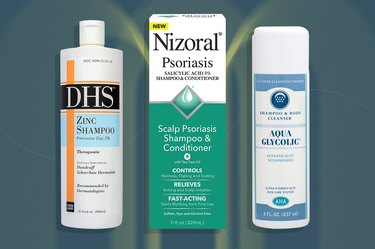
A short-lived tickle on your face can be annoying. But when an itch gets intense and won't ease up, it can get downright frustrating.
Finding lasting relief starts with figuring out what's driving your discomfort. "There are a number of causes of facial itching," says Brendan Camp, MD, FAAD, a board-certified dermatologist with MDCS Dermatology in New York City.
Video of the Day
Video of the Day
Dry skin, contact dermatitis, seborrheic dermatitis and eczema are some of the most likely culprits, but they're far from the only ones. Here's why your face is so itchy and how to treat it.
1. It's Dry Skin
Dryness can make your skin rough, tight or flaky, and it can also cause an itchy face with no rash.
Dry skin can occur anywhere on your body, but you might be more prone to dryness and itching on your face when the weather is cold or dry, especially if you spend long stretches of time outside, according to the Cleveland Clinic.
Fix It
Manage dry, itchy skin on your face by making a few adjustments to your skin-care routine: "Repairing dry skin with the use of gentle cleansers and ceramide-containing moisturizers is often sufficient treatment," says Dr. Camp.
Keep in mind, though, that too much cleansing can be drying, so stick to washing your face once a day. Moisturizers can be used multiple times per day (e.g. in the morning, after bathing and before going to bed).
Try CeraVe Hydrating Facial Cleanser ($12.08, Walmart) and Cetaphil Daily Oil-Free Hydrating Lotion for Face ($13.47, Amazon).
2. It's Razor Burn
If your face is itchy after shaving, you might have razor burn, a type of skin irritation that looks like a blotchy skin rash, per the Cleveland Clinic.
Common causes of razor burn include dry shaving, shaving too quickly, using a dull razor or shaving against the direction your hair grows. It's slightly more common in people who have sensitive skin or acne.
Fix It
You can treat after-shave itchiness at home by applying a cool washcloth to the area or applying aloe vera or a gentle moisturizer, per the Cleveland Clinic.
To prevent razor burn in the future, make sure to take your time, shaving in the direction your hair grows and using soap and water or a moisturizing shaving gel. Also remember to replace your razor blade often and store it in a dry place between uses.
3. You've Got Eczema
Eczema, an inflammatory condition that causes dry, flaky or itchy skin, can strike anywhere on your body, including your face. "It often appears with dry, pink patches of skin," says Dr. Camp.
You might find that certain triggers make your symptoms flare up: Harsh soaps or detergents, scented personal care products, cold or dry weather and exposure to seasonal allergens are all common culprits, notes the American College of Allergy, Asthma, & Immunology (ACAAI).
Fix It
See a dermatologist if you think you might have eczema. Together you can come up with a management plan, including avoiding triggers and regularly applying moisturizers or creams to keep your skin hydrated. In some cases, your derm may write you a prescription for stronger topical or oral meds to help manage your symptoms.
4. It's Seborrheic Dermatitis
Seborrheic dermatitis is a common skin condition marked by a scaly, oily rash on the scalp or face, and it can cause redness, dandruff-like flaking and itching.
"The rash often appears in the eyebrow and beard areas," Dr. Camp says.
Anyone can be affected, but the condition is more likely to occur in adults over 50, especially men and people with Black skin, according to the American Academy of Dermatology (AAD).
Fix It
Using an anti-dandruff shampoo like Nizoral ($15.47, Amazon) can help manage itching and flaking on the scalp. (Dandruff is a mild form of seborrheic dermatitis.)
Your dermatologist may prescribe an antifungal ointment or corticosteroid cream for your eyelids or face, which can ease flaking or crusting and take down swelling and itching, the AAD says.
5. It's Contact Dermatitis
If your itching started up after using a new cleanser, soap, lotion or cosmetic and is accompanied by a red rash, you could have contact dermatitis.
"It can occur as a result of skin irritation from an environmental allergen or an ingredient in a skin care product," like a preservative, fragrance or dye, says Dr. Camp.
Fix It
Contact dermatitis will usually clear up within a few days to a few weeks once you begin avoiding the offending irritant.
If you're not sure what exactly is causing your skin to react, make an appointment with a dermatologist, who can help you zero in on the culprit.
In the meantime, applying a cool compress for 10 to 15 minutes at a time may ease the itch. If that's not enough, calamine lotion ($6.35, Amazon) or a topical hydrocortisone cream like Cortizone-10 ($5.12, Amazon) can offer additional relief, notes the AAD.
6. You Got a Sunburn
A sunburn on your face isn't just uncomfortable — it can also be itchy.
"Inflammation within the skin, which presents as redness, swelling, warmth and pain, can impact superficial nerve fibers, which send the itch signal to the brain," Dr. Camp says.
If the sunburn is severe, your skin might start to peel or blister too.
Fix It
Home remedies for sunburn include keeping your skin cool and hydrated. Apply a damp cloth to your face for 10 minutes at a time, then slather on an after-sun lotion or gel containing aloe vera or soy, recommends the Mayo Clinic.
If you're still itching, an oral antihistamine like Benadryl ($7.92, Walmart) will give you some added relief (although it's likely to make you sleepy). Or you can try a non-steroidal anti-inflammatory drug (NSAID) like ibuprofen ($10.06, Amazon), which will help decrease the inflammation and offer some pain relief, too.
7. You Have Psoriasis
About half of people with psoriasis — an autoimmune condition that causes thick, scaly skin patches — experience symptoms on their face. According to the National Psoriasis Foundation, the most common spots are around the ears, mouth or eyes.
The patches tend to be dry and itchy and often flare up in response to triggers like an infection, cold weather or skin injury.
Fix It
If you think you might have psoriasis, see a dermatologist to come up with a treatment plan. Mild symptoms can be managed with ointments or creams like corticosteroids, vitamin D or retinol. For more severe cases, there are systemic medications like biologics or immunosuppressants, the Mayo Clinic notes.
8. It's Your Medication
Sometimes itching on your face or elsewhere on your body can be the result of a new medication like aspirin, some blood pressure drugs or opioid pain relievers. Radiation treatments for cancer can make your skin itchy too, according to the AAD.
Fix It
Let your doctor or care team know if you think a new medication or treatment is making your face itchy. You can talk about whether there are alternative treatments you may be able to try, or if not, strategize the most effective ways to manage your itchy skin.
Less Common Causes
Itching isn't always caused by as a skin issue. In some cases, it could be a symptom of another type of health problem. Per the Mayo Clinic, potential offenders include:
- Anemia
- Diabetes
- Liver disease
- Kidney disease
- Multiple sclerosis
- Shingles
- Mental health conditions like anxiety, depression or obsessive-compulsive disorder
Rarely, an itchy face — particularly an itchy mole on the face — could be a sign of skin cancer.
When to See a Doctor About an Itchy Face
You should let your dermatologist know if at-home measures haven't helped your facial itching within a week or two, Dr. Camp recommends. They can examine your skin to determine if you have an underlying condition like eczema or psoriasis, or refer you to your primary care doctor if the itching seems to be caused by another type of health problem.
Make an appointment with your dermatologist or primary care doctor if the itchiness is paired with a rash or if your skin appears yellow.
You should see your ob-gyn if you're pregnant and have an itchy face that doesn't go away. Mild itching is common during pregnancy, per the Mayo Clinic, but more intense itchiness could be a sign of a dangerous liver condition called cholestasis (though the itching is usually on the hands and feet in this case).
- Cleveland Clinic: "Itchy Skin"
- American College of Allergy, Asthma, & Immunology: "Eczema"
- Mayo Clinic: "Sunburn"
- National Psoriasis Foundation: "Psoriasis On The Face"
- Mayo Clinic: "Psoriasis"
- American Academy of Dermatology: "10 REASONS YOUR SKIN ITCHES UNCONTROLLABLY AND HOW TO GET RELIEF"
- Mayo Clinic: "Cholestasis of Pregnancy"
- Mayo Clinic: "Itchy Skin (Pruritis)"
- Cleveland Clinic: "Razor Burn"
Is this an emergency? If you are experiencing serious medical symptoms, please see the National Library of Medicine’s list of signs you need emergency medical attention or call 911.


